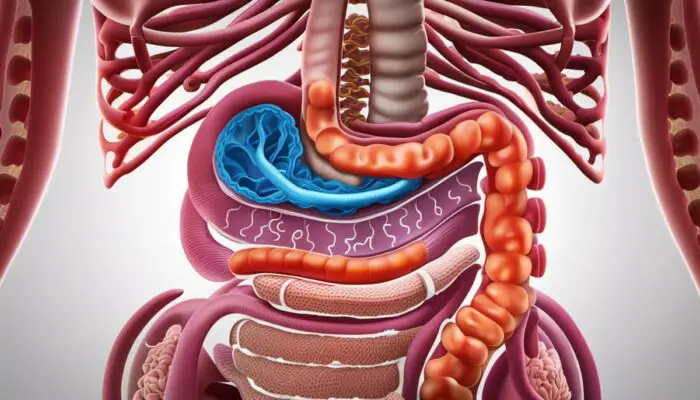The study and understanding of Inflammatory Bowel Disease (IBD), a chronic ailment affecting several individuals across the globe, often demands stripping back complex layers of misinformation. Understood fundamentally as a disease that wreaks havoc on the digestive system, IBD can take diverse forms such as Crohn’s disease and Ulcerative Colitis, each with its distinct set of symptoms and complications.
Behind the elusive curtain of IBD, there exists a myriad of causes – including, but not limited to, genetics, immune system abnormalities, and various environmental influences.
Many researchers are now seeking to unravel the knotted relationship between diet, gut bacteria, and IBD, with a particular focus on how certain food, drink, and antibiotics can mold our gut flora thereby potentially triggering inflammation and the onset of IBD.
Concurrently, it’s crucial to debunk widespread myths about the origins of IBD, such as the notion that stress or dietary intolerances are the main culprits, to establish a clear, scientifically-backed narrative.
What is Inflammatory Bowel Disease (IBD)?
Inflammatory Bowel Disease
Inflammatory bowel disease, commonly referred to as IBD describes a group of disorders that cause chronic inflammation in the digestive tract. This umbrella term encompasses two main types: Crohn’s disease and ulcerative colitis. Both of these conditions are known for their debilitating effects and are often characterized by intense discomfort, pain, fatigue, and severe diarrhea.
Crohn’s Disease and Ulcerative Colitis
Crohn’s Disease is an inflammatory condition that can affect any part of the gastrointestinal tract, although it most often affects the lower part of the small intestine, known as the ileum.
Ulcerative Colitis primarily affects the colon (the large intestine) and the rectum. This condition leads to ulcers, or sores, forming on the inner lining of the large intestine as well as inflammation.
Causes of Inflammatory Bowel Disease
When it comes to understanding what causes inflammatory bowel disease, the exact answer remains somewhat obscured. However, there are numerous contributing factors that have been identified. These can be broadly divided into categories: genetics, abnormal immune response, and environmental factors.
Genetics and Family History of IBD
In terms of genetics, there is evidence to suggest that IBD is more common in people who have family members with the disease. This indicates that a susceptibility to the condition can be inherited, but it’s also worth noting that most people with IBD do not have a family history of this illness.
Abnormal Immune Response
Another contributing cause is an abnormal immune response. Under normal circumstances, the immune system fights off harmful bacteria and viruses in the body. However, in those with IBD, the immune system can malfunction and start to attack healthy cells in the gut. Thus triggering an unnecessary immune response that causes inflammation and associated symptoms of IBD.
Environmental Factors
Lastly, various environmental factors can influence the onset of IBD. This includes aspects such as diet and lifestyle. For example, IBD appears to be more prevalent in developed countries, urban areas, and northern climates. Moreover, it’s more common in those with a high-fat diet or who smoke. The use of nonsteroidal anti-inflammatory medications can also increase the likelihood of developing IBD.
Known Causes of Inflammatory Bowel Disease
The Role of Genetics in Inflammatory Bowel Disease
There is evidence to suggest that genetic components may render some individuals more prone to developing Inflammatory Bowel Disease (IBD). In fact, research has pinpointed over 200 genetic variants that could heighten the risk of contracting this condition.
This is particularly the case for those with a family heritage of IBD who are statistically more likely to be stricken than those without such a history. However, the fact that not everyone with these genetic irregularities goes on to develop the disease implies other pertinent factors must also come into play.
Immune System Malfunctions and IBD
One compelling theory places the immune system at the center of the IBD problem. Under normal circumstances, the immune system defends the body from harmful bacteria, viruses, and other foreign bodies.
In people with IBD, however, the immune system mistakenly attacks the cells in the digestive tract, causing inflammation and leading to symptoms such as abdominal pain and diarrhea. This abnormal immune response could be due to genetically dictated improper regulation or to an unidentified trigger that sets the immune system into overdrive.
Environmental Factors and IBD
Certain environmental factors can heighten the risk of IBD. For example, people living in industrialized countries are more likely to develop the condition than those in non-industrialized countries. Moreover, urban dwellers have been found to have a higher risk than those living in rural areas.
Lifestyle choices, such as diet and smoking, have also been implicated. A high intake of unsaturated fats, meats, and refined sugars can increase susceptibility. Smoking seems to worsen the course of Crohn’s disease, one of the two main forms of IBD, but curiously, it may protect against ulcerative colitis, the other predominant form.
Lifestyle Habits and IBD
Certain lifestyle habits can both exacerbate existing IBD and increase the risk of its onset. Studies have shown a link between a sedentary lifestyle and IBD. Lack of exercise and prolonged sitting may heighten susceptibility to the disease. High-stress lifestyles may also contribute to IBD.
Though stress doesn’t directly cause IBD, it can aggravate symptoms and induce flare-ups in those with the disease. Alcohol use can both aggravate IBD and raise the risk of its manifestation. Frequent alcohol consumption may fuel inflammation and interfere with the effectiveness of IBD medications.
Despite advancements in understanding the causes of Inflammatory Bowel Disease (IBD), there is still much to learn. The current belief is that the disease is the product of a complex relationship between genetics, the immune system, and a variety of lifestyle and environmental factors. Continued research is fundamental to unraveling the intricate interactions and their vital roles both in the development and exacerbation of IBD.
The Role of Diet and Gut Bacteria in IBD
The Influence of Diet on Inflammatory Bowel Disease
A significant focus of conversations regarding the causes of Inflammatory Bowel Disease (IBD) revolves around diet. Our dietary habits can have a profound impact on our gut microbiome, the community of billions of bacteria, viruses, and other microbes that inhabit our digestive system.
It’s recognized that these microscopic organisms perform critical roles in digestion, immunity, and a range of other bodily functions. However, when an imbalance occurs, referred to as dysbiosis, it can result in numerous issues, including the persistent gut inflammation typified in IBD.
Specific foods, particularly those laden with fat and sugar, can upset the equilibrium of gut bacteria. On the other hand, diets abundant in fiber, fruits, and vegetables promote the proliferation of beneficial bacteria. Moreover, certain fermented foods, like yogurt and kefir, are believed to enhance gut well-being due to their high probiotic concentrations.
The Impact of Beverages on Gut Health
Equally important is the role of beverages in contributing to gut health. Alcoholic and caffeinated drinks, for instance, can irritate the gut lining, creating conditions conducive to inflammation. Likewise, sugary drinks have been linked to an increase in harmful bacteria, while promoting obesity and inflammatory diseases.
In contrast, plenty of water and herbal teas, known for their anti-inflammatory properties, can aid in maintaining a healthy gut environment.
Antibiotics and Gut Bacteria Imbalance
Another significant cause of dysbiosis is the use of antibiotics. These drugs, although crucial in combating bacterial infections, can have a profound impact on gut bacteria, eliminating not only harmful but also beneficial microbes. This can lead to a significant decrease in diversity, a key aspect of a healthy microbiome.
Overuse of antibiotics, particularly at a young age, has been linked in multiple studies to an increased risk of developing IBD. While it’s critical to note antibiotics are often a necessary and life-saving treatment, their use should be precisely managed to avoid potential long-term consequences.
External Factors Influencing Gut Microbiome and IBD
Consideration also needs to be given to other external influences, including stress and lack of sleep, both of which can negatively impact gut health. Emerging research suggests that gut bacteria may be significantly influenced by our circadian rhythms, meaning that irregular sleep patterns could potentially upset the microbiome balance.
Our dietary habits, lifestyle choices, and medical treatments play a crucial role in maintaining the health of our gut microbiome. The imbalance of these gut microorganisms may give rise to conditions like Inflammatory Bowel Disease (IBD). Whilst research on this subject is ongoing, recognizing the interplay between our gut microbiome, diet, and lifestyle may provide new ways to prevent and manage chronic conditions such as IBD.

Debunking Myths about IBD’s Causes
Exploring the Causes
The exact causes of inflammatory bowel diseases (IBDs) such as Crohn’s disease and ulcerative colitis remain unclear, though a few accepted facts exist. Most theories suggest that IBD may result from an unusual reaction from the body’s immune system, which then leads to inflammation in the gastrointestinal tract.
Alongside this, a mix of genetics, environment, and lifestyle aspects can make an individual more susceptible. Recent findings demonstrate that people with distinct genetic markers have a higher likelihood of developing IBD, and over 200 IBD-related genetic loci have been identified so far. Environmental factors like cigarette smoke, NSAIDs use, and certain infections can also exacerbate this condition.
Clarifying the Role of Stress
A popular misconception is that stress can directly cause IBD. However, this belief needs to be clarified; whilst stress can indeed worsen symptoms of established IBD, it does not directly initiate the condition. However, managing stress can help control flare-ups and alleviate symptoms in those already living with IBD, though it is not a preventative measure.
Understanding Food Allergies and IBD
Another prevalent misunderstanding is the connection between food allergies and IBD. While certain foods can potentially intensify or trigger IBD symptomshttps://dynamicideas4life.com/5-lifestyle-changes-to-control-acid-reflux/, scientific research does not substantiate food allergies as a direct cause of the disease. However, a healthy and balanced diet is beneficial to overall health, and those living with IBD may find symptom relief through making dietary modifications under professional guidance.
The Impact of Misunderstanding
Misconceptions surrounding the causes of IBD can lead to misinformation and potentially hazardous self-diagnosis and inappropriate treatment. People might mistake their IBD symptoms as a result solely of a stress or diet and might neglect the significant role genetic and environmental factors play. As a result, they could miss out on a necessary medical intervention or beneficial lifestyle changes.
Thus, it is crucial to understand that whilst lifestyle factors can influence IBD symptoms, they do not directly cause the disease. For an accurate diagnosis and management of IBD, consultations with healthcare professionals are recommended rather than relying purely on self-diagnosed causes or remedies.

In Conclusion
All too often, an accurate understanding of the complexities of conditions like Inflammatory Bowel Disease is blurred by misinformation and unsubstantiated beliefs. Fortunately, scientific research continues to drive evolution in our knowledge base concerning this disease.
From the essential insight into how IBD affects the body to the exploration of its purported causes, it’s imperative that we cultivate a culture of informed knowledge. This can enable patients and their families to make judicious lifestyle choices guided by scientific evidence rather than fall victim to damaging myths and misconceptions.
In this ongoing journey of discovery, we start to see the linking threads between IBD, the diet we consume, our gut bacteria, and the world we inhabit. Unraveling this intricate tapestry requires us to combat the claims unsupported by scientific evidence, helping us inch closer to a comprehensive understanding of Inflammatory Bowel Disease and its causes.




Anxiety and Depression best ways to lower blood sugar BiOptimizers blood pressure supplements blood sugar support supplements Digestive Enzymes Supplement digital products Dr Sam Robbins Erectile dysfunction Exercise Gut Health Healthy Living heart health HFL how to lower blood sugar levels How To Lower Cholesterol insulin resistance joint health supplement Keto keto dieting Keto Diet Weight Loss leaky gut supplements leptin resistance list Magnesium deficiency Matt Gallant mental health multivitamins Nootropics nutrient supplements Probiotics Probiotic Supplements proteolytic enzymes reverse type 2 diabetes stress and anxiety stress relief vitabalance vitapost Wade Lightheart weight loss articles weight loss diet plans weight loss product reviews weight loss supplements weight loss supplements that work weight loss tea
